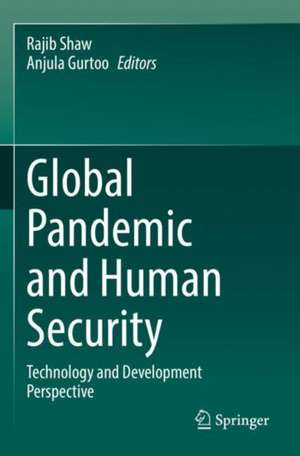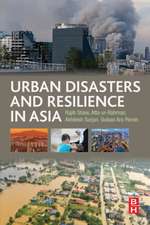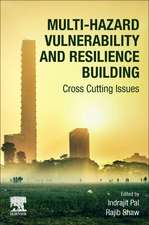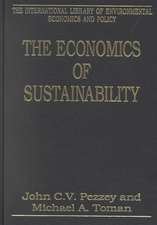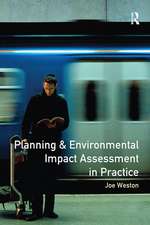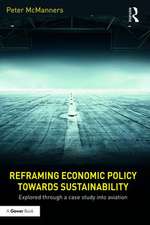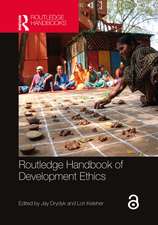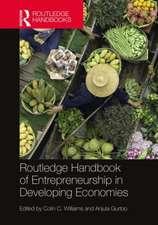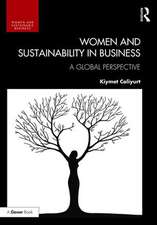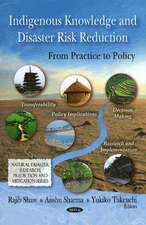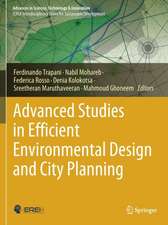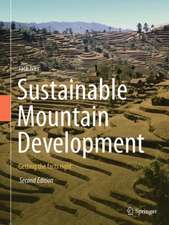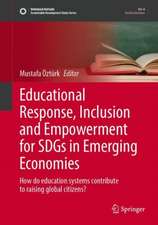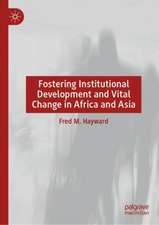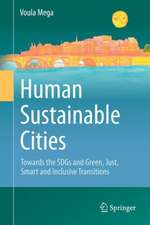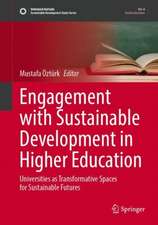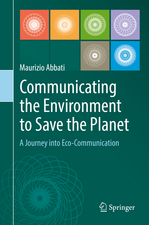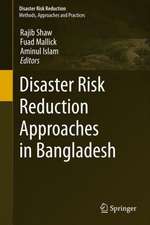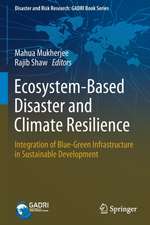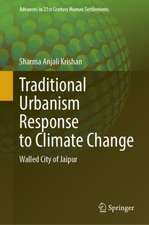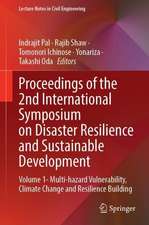Global Pandemic and Human Security: Technology and Development Perspective
Editat de Rajib Shaw, Anjula Gurtooen Limba Engleză Paperback – 3 mar 2023
This book highlights how the human security aspect has been affected by the global pandemic, based on the specific case study, field data, and evidence. COVID-19 has exemplified that the pandemic is global, but its responses are local. The responses depend on national governance and policy framework, use of technology and innovation, and people’s perceptions and behavior, among many others. There are many differences in how the pandemic has affected the rich and the poor, urban and rural sectors, development and fiscal sectors, and developed and developing nations and communities.
Echoing human security principles, the 2030 Agenda emphasized a “world free of poverty, hunger, disease and want… free of fear and violence… with equitable and universal access to quality education, health care, and social protection….to safe drinking water and sanitation… where food is sufficient, safe, affordable and nutritious… where habitats are safe, resilient and sustainable…and where there is universal access to affordable, reliable and sustainable energy.”
These basic human security [PA1] principles and development agenda are highly affected by the global pandemic worldwide, irrespective of its development and economic status. Thus, the book highlights the nexus between human security and development issues. It has two major pillars, one is the development and the other is technology issues. These two inter-dependent topics are discussed in the perspective of the global pandemic, making this the most important feature of this book.
While the world is still in the middle of a pandemic, and possibly other natural and biological hazards may affect peoples’ lives and livelihoods in the future, this book provides some key learning, which can be used to cope with future uncertainties, including climate risks. Thus, the book is timely and relevant to wider readers.
| Toate formatele și edițiile | Preț | Express |
|---|---|---|
| Paperback (1) | 899.48 lei 6-8 săpt. | |
| Springer Nature Singapore – 3 mar 2023 | 899.48 lei 6-8 săpt. | |
| Hardback (1) | 904.76 lei 6-8 săpt. | |
| Springer Nature Singapore – 2 mar 2022 | 904.76 lei 6-8 săpt. |
Preț: 899.48 lei
Preț vechi: 1096.94 lei
-18% Nou
Puncte Express: 1349
Preț estimativ în valută:
172.11€ • 179.70$ • 142.45£
172.11€ • 179.70$ • 142.45£
Carte tipărită la comandă
Livrare economică 05-19 aprilie
Preluare comenzi: 021 569.72.76
Specificații
ISBN-13: 9789811650765
ISBN-10: 9811650764
Pagini: 433
Ilustrații: XVI, 433 p. 1 illus.
Dimensiuni: 155 x 235 mm
Greutate: 0.69 kg
Ediția:1st ed. 2022
Editura: Springer Nature Singapore
Colecția Springer
Locul publicării:Singapore, Singapore
ISBN-10: 9811650764
Pagini: 433
Ilustrații: XVI, 433 p. 1 illus.
Dimensiuni: 155 x 235 mm
Greutate: 0.69 kg
Ediția:1st ed. 2022
Editura: Springer Nature Singapore
Colecția Springer
Locul publicării:Singapore, Singapore
Cuprins
Chapter 1. Introduction: Global pandemic, human security,technology and development.- Chapter 2. DEVELOPMENTAL AGENDA AND THE GLOBAL PANDEMIC.- Chapter 3. Co-evolution of Pandemic, Human Security and Technology.- Chapter 4. Fiscal policies and post COVID-19 development challenges: An overview.- Chapter 5. Climate change and human security in the context of the global pandemic: Emphasising responses that maximise synergies.- Chapter 6. Global pandemic and human security: Using Health-EDRM risk assessment framework to enhance technology support for DRR.- Chapter 7. Those Above Poverty Line: Development and Vulnerability to the Pandemic.- Chapter 8. URBAN-RURAL LINKAGES AND THEIR IMPLICATION TO HUMAN SECURITY IN PANDEMIC TIME.- Chapter 9. International migration and human security under the COVID 19 pandemic.- Chapter 10. Fragility and resilience in food systems: What can we learn from the COVID-19 crisis?.- Chapter 11. Challenges and Solution Pathways in Water Use through the Lens of COVID-19.- Chapter 12. Education in the time of a pandemic.- Chapter 13. Implications on Gender during the Pandemic.- Chapter 14. Access to green spaces: Consider green infrastructure implementation with/post-COVID-19 world.- Chapter 15. “A Sustainable and Resilient Urban Transportation System”.- Chapter 16. Responses for COVID-19 in the Pacific Small Island Countries.- Chapter 17. "Between protection and empowerment COVID-19: Haiti’s older people’s perception and behavior".- Chapter 18. Government Responses to COVID-19 and their implications on Food Security in Indonesia.- Chapter 19. Preparing for the future crisis: frontier technologies hold the key.- Chapter 20. Emerging Technologies & Global Pandemic.- Chapter 21. The importance of data sharing in managing public health crises.- Chapter 22. Governing Artificial Intelligence in post-pandemic society.
Notă biografică
Rajib Shaw is a professor in the Graduate School of Media and Governance at Keio University, Japan. He is also the Senior Fellow of the Institute of Global Environmental Strategies (IGES) Japan, and the Chairperson of SEEDS Asia and CWS Japan, two Japanese NGOs. He is also co-founder of a Delhi (India) based social entrepreneur startup Resilience Innovation Knowledge Academy (RIKA). Earlier, he was the Executive Director of the Integrated Research on Disaster Risk (IRDR) and was a Professor at Kyoto University. His expertise includes disaster governance, community-based disaster risk management, climate change adaptation, urban risk management, and disaster and environmental education. Professor Shaw was the Chair of the United Nations Science Technology Advisory Group (STAG) for disaster risk reduction, and currently the Co-chair of the Asia Pacific Science Technology Academic Advisory Group (ASTAAG). He is also the CLA (Coordinating Lead Author) for the Asia chapter of IPCC’s 6th Assessment Report. He is the editor-in-chief of the journal “Progress in Disaster Science”, and series editor of a Springer book series on disaster risk reduction. Prof. Shaw has published 52 books and over 400 academic papers and book chapters.
Anjula Gurtoo is a professor at the Indian Institute of Science, Bangalore, India. She is also the Chairperson of the Policy Centre at the Institute. She works in the area of public policy including informal economy, urban infrastructure, and public systems. Prof. Gurtoo has published 2 books and over 70 academic papers and book chapters. She is the recipient of the Chevening/Rolls-Royce Science and Innovation Leadership Fellowship, British High Commission, United Kingdom, (2017), Pt. Jawaharlal Nehru National Award for her outstanding contribution in the field of Public Policy and Social Science from the Department of Science and Technology, Government of Madhya Pradesh, India (2010-12), and the Social Science Research Award for overall contribution to research, by the International Development Research Centre (IDRC), Canada (2009). She is an expert member in several governmental committees including Karnataka Bio Economy Report 2020 (KBER), Rajasthan Public Service Commission, Empanelment Committee of Karnataka Evaluation Authority, and Professional Technical Advisory Committee, Karnataka Municipal Data Society.
Textul de pe ultima copertă
This book highlights how the human security aspect has been affected by the global pandemic, based on the specific case study, field data, and evidence. COVID-19 has exemplified that the pandemic is global, but its responses are local. The responses depend on national governance and policy framework, use of technology and innovation, and people’s perceptions and behavior, among many others. There are many differences in how the pandemic has affected the rich and the poor, urban and rural sectors, development and fiscal sectors, and developed and developing nations and communities.
Echoing human security principles, the 2030 Agenda emphasized a “world free of poverty, hunger, disease and want… free of fear and violence… with equitable and universal access to quality education, health care, and social protection….to safe drinking water and sanitation… where food is sufficient, safe, affordable and nutritious… where habitats are safe, resilient and sustainable…and where there is universal access to affordable, reliable and sustainable energy.”
These basic human security [PA1] principles and development agenda are highly affected by the global pandemic worldwide, irrespective of its development and economic status. Thus, the book highlights the nexus between human security and development issues. It has two major pillars, one is the development and the other is technology issues. These two inter-dependent topics are discussed in the perspective of the global pandemic, making this the most important feature of this book.
While the world is still in the middle of a pandemic, and possibly other natural and biological hazards may affect peoples’ lives and livelihoods in the future, this book provides some key learning, which can be used to cope with future uncertainties, including climate risks. Thus, the book is timely and relevant to wider readers.
Caracteristici
First attempt to link human security and development agenda in the middle of the pandemic Shows a balanced approach of two inter-connected issues of development and technology concerning global pandemic Draws lessons from field data, case studies and ground realities
